How Much Does PODS Cost?
Quick answer: PODS container costs range from $220 for a local move with an 8-ft container to $7,448 for a long-distance move with a 16-ft container. If you need a PODS storage unit after moving, prices start at $149 per month, with average delivery and pickup fees of $75.
What determines PODS costs:
- Container size: Larger containers usually have higher rental fees than smaller ones.
- Storage time: The longer you need to rent a PODS container, the more it will cost.
- Location: Costs vary by location, and storing PODS on your property can be cheaper than a facility.
- Distance: PODS costs fluctuate based on the distance of the move and how complex it is.
- Time of year: Renting PODS in the summer can be more expensive due to higher demand.
- 30 days storage included
- Local and long distance moving options
- Unlimited loading/unloading time
- Store on property or at a facility
| Distance | 8-foot container | 12-foot container | 16-foot container |
|---|---|---|---|
| Local move (~50 miles) | $220-$426 | $294-$637 | $323-$813 |
| Long-distance move (up to 250 miles) | $450-$828 | Local moves only | $911-$2,107 |
| Cross-country move | $2,068-$4,028 | Local moves only | $5,439-$7,448 |
We’ve gathered quotes from PODS, collected firsthand reviews from customers, and analyzed PODS’ services, sizes, pricing, and availability. Read on to see why it tops our list of the best moving container companies.
Our track record










How much does PODS cost?
PODS storage costs start at $150 per month. Based on our research, moving with PODS costs anywhere from $220 to $7,448. The best way to determine the cost of PODS moving and storage services is to get a quote.
A free quote from PODS includes one month of storage, pickup and delivery fees, and transportation costs. You can also pay extra for packing supplies and labor. For a more customized estimate from PODS and other moving container companies, use our pods moving cost calculator below.
PODS cost by container size
PODS offers three container sizes, with lengths of 8, 12, and 16 feet. Containers cost different amounts based on the size. Here’s the pricing breakdown based on a quote we got for a local Atlanta move with storage:
| Fees | 8-foot | 12-foot | 16-foot |
|---|---|---|---|
| Delivery & pickup fees | $88.19 | $88.19 | $88.19 |
| First-month rental fee | $151.89 | $191.09 | $205.79 |
PODS cost by distance
Local moves are much cheaper than long-distance moves when using the same size container because of the lower transportation costs. Here are some average PODS moving costs based on distance.
| Distance | Average cost range |
|---|---|
| 250 miles | $768-$2,401 |
| 500 miles | $2,401-$3,842 |
| 1,000 miles | $2,881-$4,802 |
PODS local moving cost
For local moves, you can get a free instant PODS quote online. Here’s the price breakdown for a quote for a local move with storage costs that we got for the Atlanta, GA area:
| Description | 8-foot container | 12-foot container | 16-foot container |
|---|---|---|---|
| Container delivery | $88.19 | $88.19 | $88.19 |
| 1st-month rental fee | $151.89 | $191.09 | $205.79 |
| Additional month’s rental fee | $186.19/mo. | $186.19/mo. | $186.19/mo. |
| Move container to new location | $93.09 | $93.09 | $93.09 |
| Final Pickup | $88.19 | $88.19 | $88.19 |
| Insurance | $14.70 – $416.50/mo. | $14.70 – $416.50/mo. | $14.70 – $416.50/mo. |
| Padlock | $34.30 | $34.30 | $34.30 |
PODS long-distance moving cost
PODS pricing can vary widely for long-distance or interstate moves. Unfortunately, you’ll need to make a phone call to get an exact quote, since PODS’ website doesn’t provide instant online quotes for long-distance moves. Here are some general cost ranges based on our research:
| Distance | < 250 miles | Cross country |
|---|---|---|
| 1 Bedroom | $450 – $828 | $2,302 – $3,889 |
| 2-3 Bedrooms | $750 – $1,842 | $3,003 – $4,649 |
| 4-5 Bedrooms | $931 – $2,137 | $4,152 – $6,849 |
PODS storage cost
Every PODS rental includes 30 days of storage for free, with the option to use their containers for extended storage at a PODS facility or onsite in your driveway. PODS storage costs start at $150 per month, with drop-off and pickup fees of $75 each.
Monthly rental expenses can be as high as $359 per month based on your geographic location, demand, and container size. Pricing can also vary based on whether you keep the storage container at a PODS storage center or in your driveway.
89% of users select this mover
What factors affect PODS cost?
Moving container companies look at a number of factors when they’re preparing a quote for your move. Here are a few that can change the cost of your move.
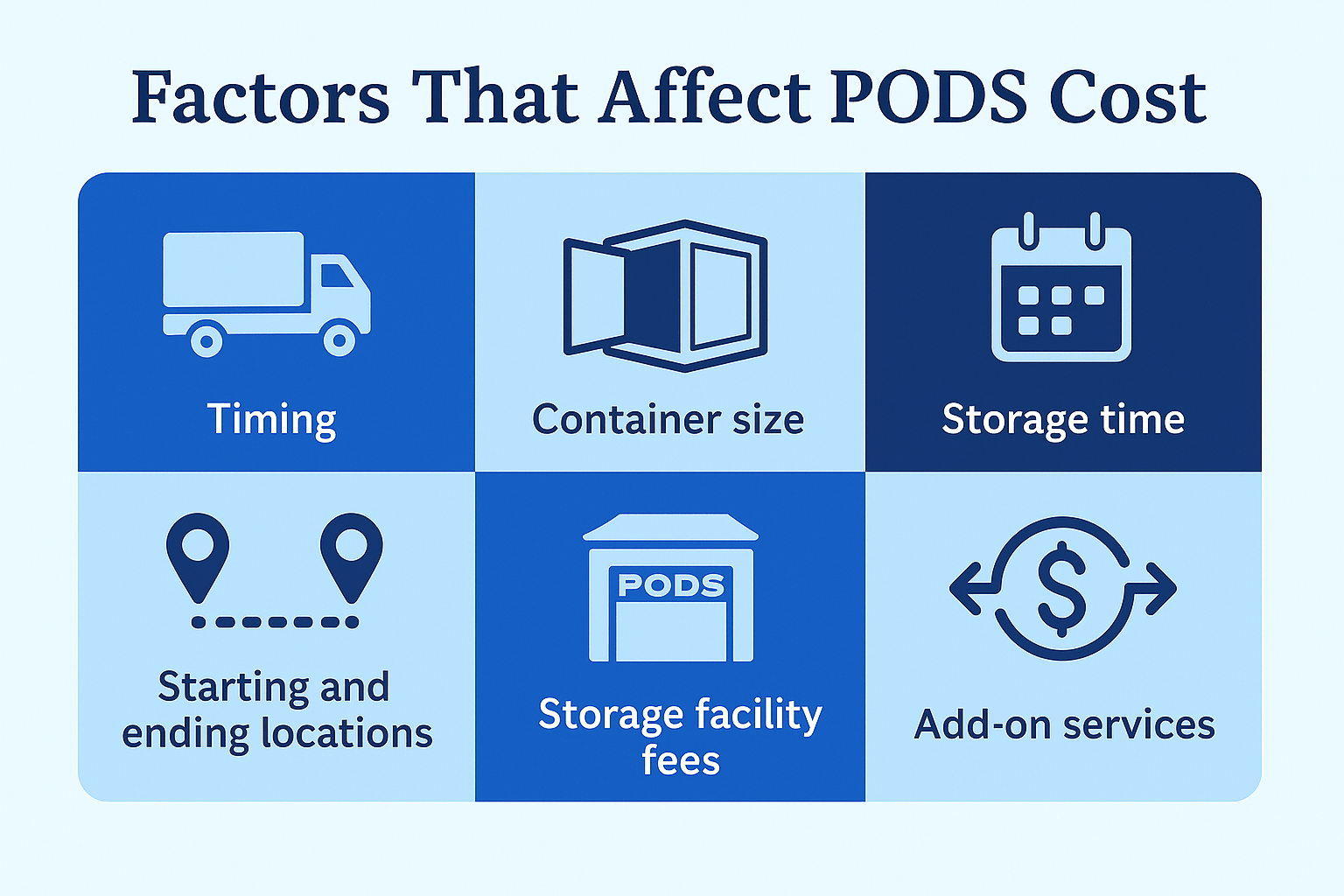
- Timing: Spring and summer are peak moving times, which means they’re often more expensive. And since more people want to move on the weekends, prices may go up to reflect more limited availability on Saturdays and Sundays.
- Starting and ending locations: How far the company needs to travel to deliver or pick up your PODS moving containers and local conditions and availability also come into play.
- Move size: If you have more stuff, you’ll need more or bigger moving containers, which will be pricier than a smaller move that requires fewer containers.
- Add-on services: PODS offers add-on services like packing materials. PODS can also recommend moving companies that ship cars in your area. Be sure to check out our guide to car shipping services for more details on pricing and options.
- Delivery and pick-up fees: These fees vary depending on your location and the timing of your move. The more flexible you are with your move dates, the more you can save.
- Storage facility fees: You can store your PODS container on your property or at a PODS storage facility for a fee. You’ll pay for storage on a monthly basis.
While this service increases costs, it’s a great option if you need a little more time during the move, want added security, or you’re concerned about weather during storage.
89% of users select this mover
PODS cost vs. other moving container companies
PODS isn’t the only option in the moving and portable storage container space. With that in mind, let’s take a look at how PODS’ costs compare to four of its biggest competitors:

Licensed
Insured
Price
|
|
|
|
|
These moving container costs are just average prices, and may not reflect the quotes you actually receive from these moving and storage container companies. Every move is different, so you should get personalized quotes from every company you’re considering so you have a better idea of your storage container cost.
Compare cost for a local move
Compare cost for a long-distance move
Compare cost for a cross-country move
While PODS isn’t always the cheapest option for a local or long-distance move, it is definitely competitive on pricing in most categories. In fact, we picked PODS as one of the top companies for cheapest moving pods and container companies.
PODS cost vs. professional moving companies
Sometimes PODS costs more than professional moving companies depending on the shipping distance, time of the move, and services.
If the quote for your PODS moving containers is similar to the quote from professional movers, it might make sense to go with the pros. Professional movers will load, pack, move, and unload everything for you.

Licensed
Insured
Price
|
|
|
PODS services
Whether you’re planning a move or simply looking for a convenient way to handle your storage needs, PODS’ portable storage services have a lot to offer.
- Local and long-distance moves: PODS offers eight- and 16-foot containers for both local and long-distance moves, while 12-foot containers are available for local moves only. You can move anywhere from across town to across the country.
- City moves: PODS also offers a customized City Service that factors in all the unique considerations of moving in a large urban area.
- Storage solutions: Rentals include 30 days of free storage, with options for ongoing storage either on your property or at a PODS facility. You can keep your POD as long as you like.
- Car shipping: PODS partners with Acertus and Mr. Car Shipper to help coordinate vehicle transport alongside container shipments. Costs vary based on the provider, vehicle type, and distance.
- International moves: PODS supports moves to/from Canada and operates within the UK and Australia but does not facilitate international moves within these countries.
PODS sizes
The larger the container, the more expensive your move will be. Here’s a look at PODS sizes:
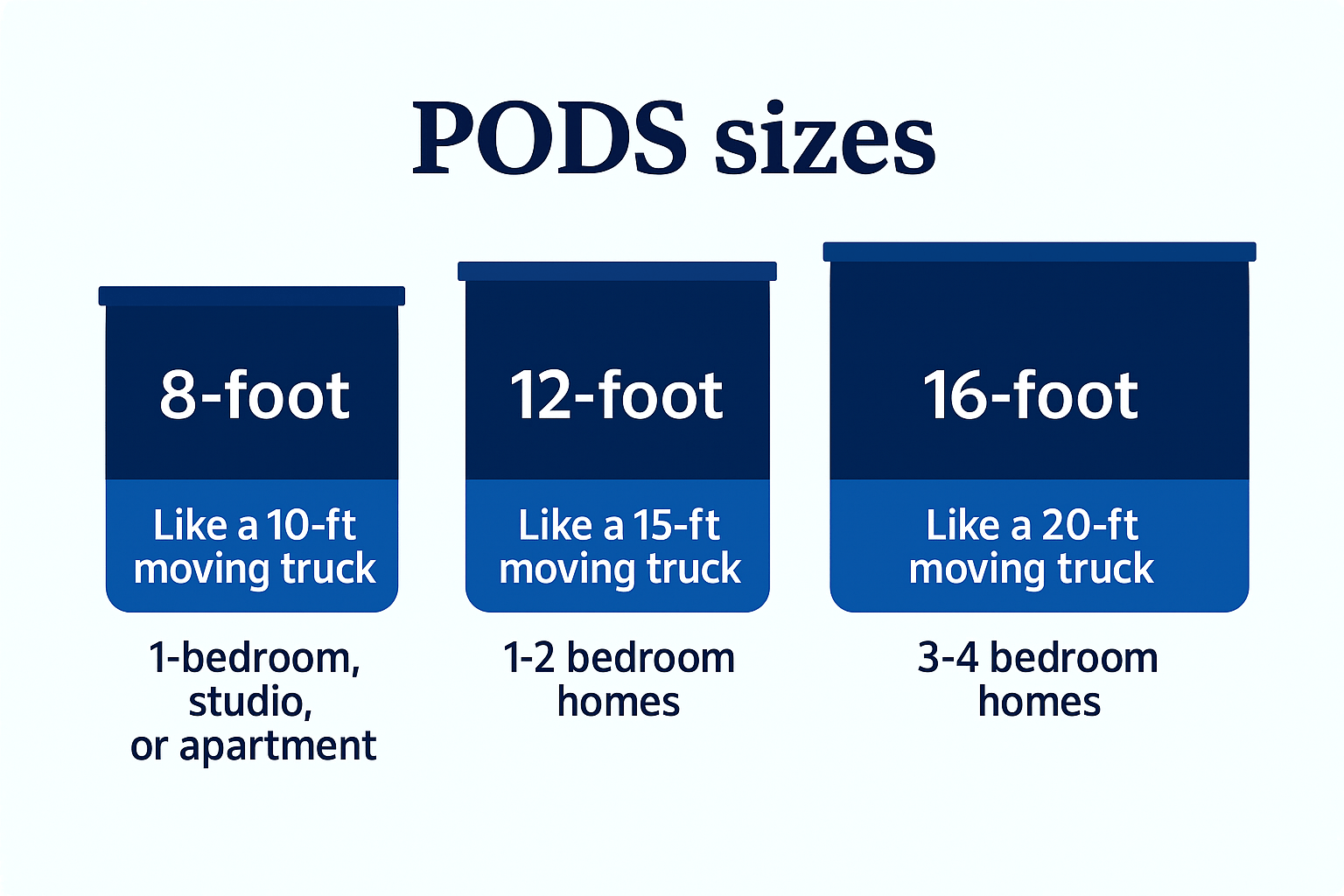
- 8-foot containers: Comparable to a 10-foot moving truck, PODS’ 8–foot containers are well-suited for the contents of a one-bedroom or studio apartment. They’re a popular pick for college students, partial moves, and people trying to downsize.
- 12-foot containers: Similar in size to a 15-foot moving truck, they’re a good choice for one- to two-bedroom moves. However, because they’re only available for city-to-city moves of 50 miles or less, households doing long-distance pods moves will likely need to upgrade to a 16-foot container.
- 16-foot containers: Often used for homes with three- to four-bedrooms. They offer similar space to a 20-foot moving truck, though PODS also suggests imagining them as equivalent to a ‘parking space in 3D.
What customers had to say about PODS
We interviewed several PODS customers to get the scoop on their moves. Take a look at what they had to say about their experiences moving with PODS.
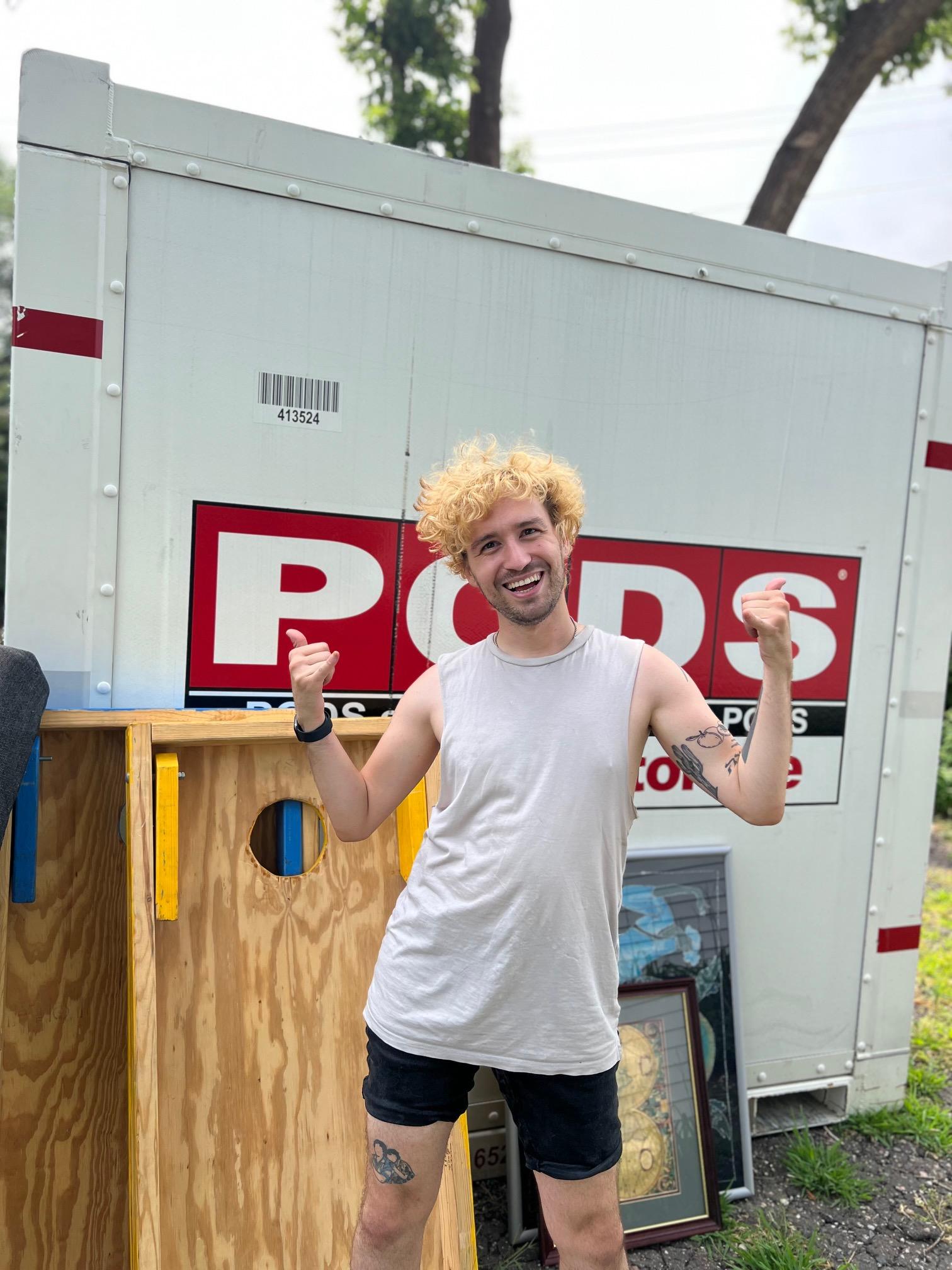


While he wished he’d had more guidance on parking permits, Alex was highly satisfied with his PODS move. Similar to Alex, Bethany appreciated PODS’ hybrid moving option.
For Bethany, the final cost matched the initial quote. Both Alex and Bethany valued PODS for their straightforward booking process and the care they took with their belongings.



Everyone’s moving experiences are different, so it’s smart to read several reviews to get a sense of a company’s customer experience. Here are a couple more reviews from readers who booked PODS for their moving and storage needs.
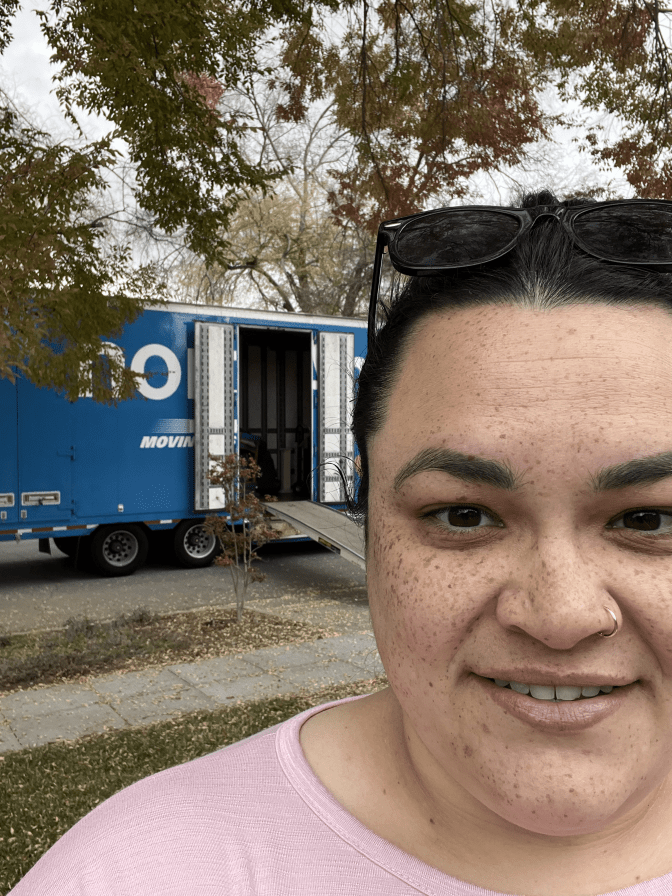


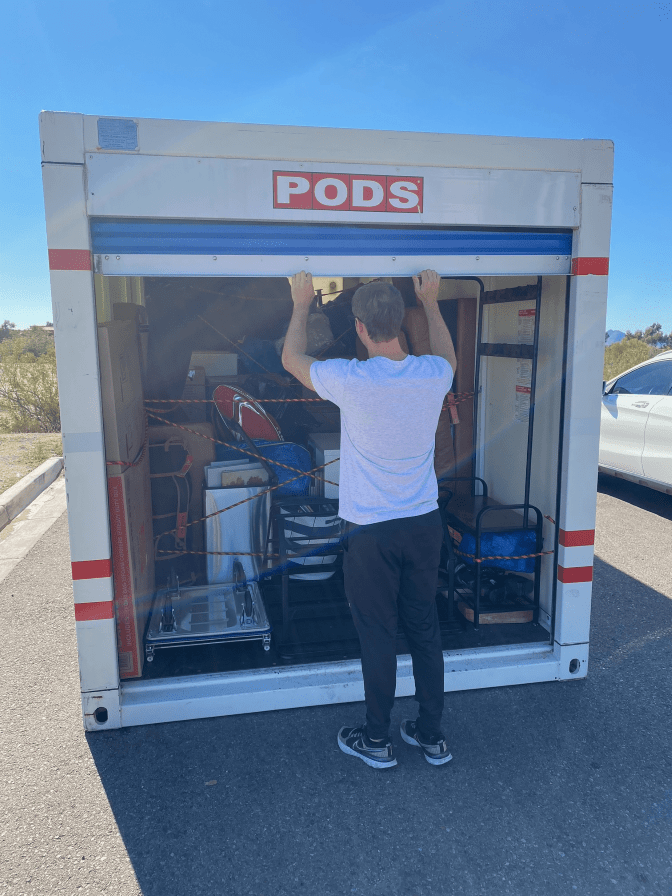


Pros and cons of moving with PODS
- Provides three container sizes (more than most)
- Has moving and storage combination options
- Lets you make changes mid-move
- Extends a money-back cancellation policy
- Offers 30 days of free storage and other discounts
- Requires a call to book long-distance moves
- Not available in Alaska, Montana, North Dakota, and Wyoming
- No tracking while the container is in transit
How to lower your PODS moving cost
Here are a few ways to save money on your move with PODS.
- Downsize. Decluttering for a move will make relocating easier and cheaper. Depending on how much you can downsize, you may even be able to save by renting a smaller PODS container.
- Ask about deals and promotions. PODS regularly offers moving container discounts and promotions that can lower the total cost of your move. Be sure to check their website or ask a service representative about available deals before booking.
- Compare prices. Try to get a quote from at least two other moving container companies in your area to compare prices and availability. This will help you find the best deal for your move. You can get started using our moving cost calculator.
- Avoid peak times. Demand for moving containers tends to peak during the summer, which increases prices and makes it harder to book a container. When possible, try to book your move for the off-season or during the middle of the week or month, when fewer people schedule moves.
- Skip the add-ons. PODS offers additional services like third-party packing and loading assistance and boxes and moving supplies. Obtaining cheap or free moving boxes and taking care of the labor yourself can save you money. Just don’t skimp on moving insurance. Make sure you have adequate coverage for your belongings.
FAQs
What does PODS stand for?
Is it cheaper to use PODS or moving companies?
Is PODS cheaper than a storage unit?
Is it cheaper to use PODS or a moving truck?
What size PODS moving container do I need for a three-bedroom house?
Is Zippy Shell or PODS cheaper?
Not what you were looking for?
Check out other categories that can help you find the information you need!








